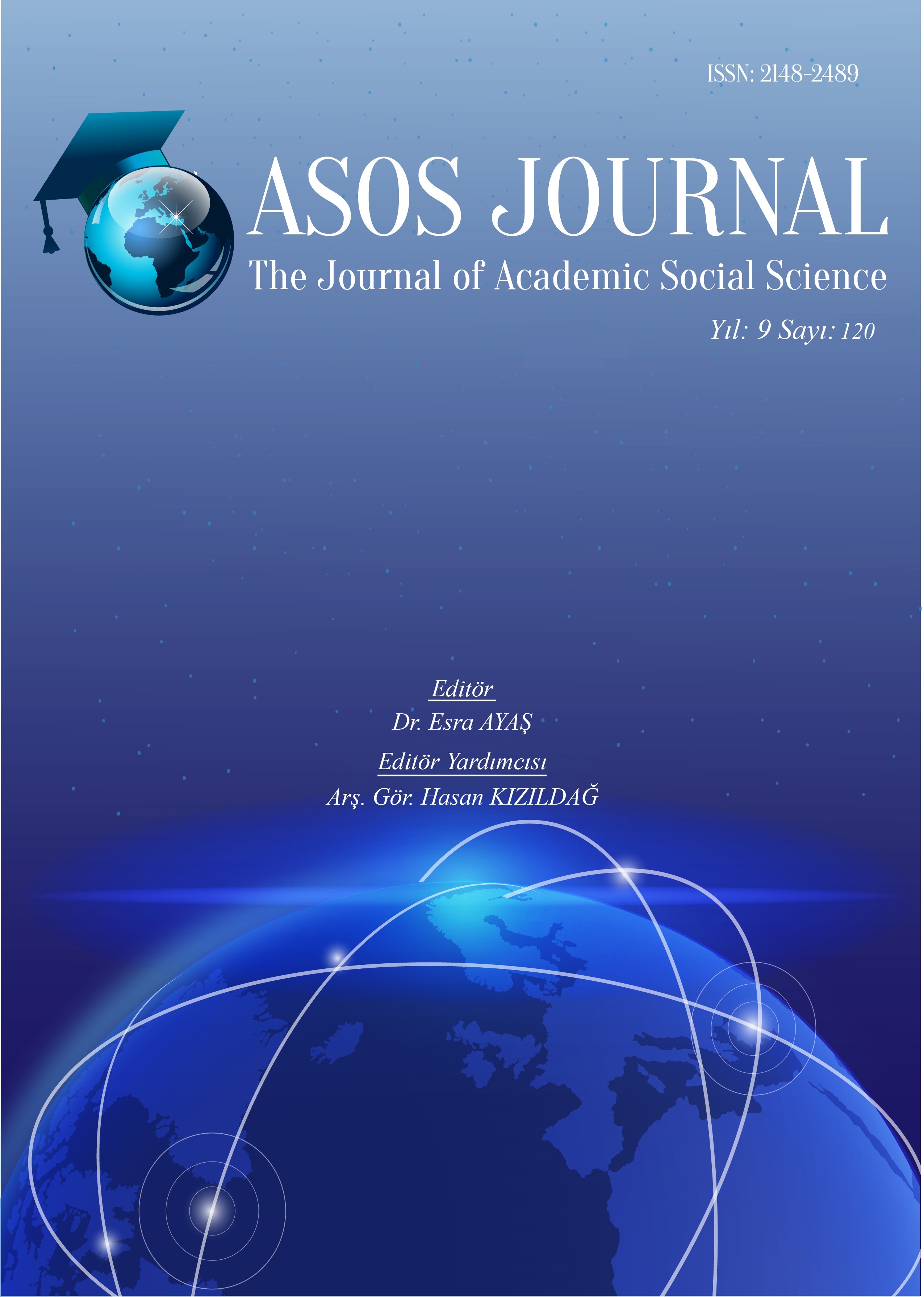Author :
Abstract
Şilili yazar Antonio Skármeta’nın, Ardiente paciencia başlıklı romanından, Il Postino adıyla önce sinemaya daha sonra da opera sahnesine aktarılan eser, metin ve müzik yoluyla, dünyamızı okumanın veya yeniden incelemenin gerekliliğini, yorumlama stratejilerimizi, dilin ekolojik, çevresel bağlam ve koşullarını gözler önüne serer (Randall, 2017). Metin, esasen anlatının dilsel karmaşıklığıyla ilişkili olarak, kendi yorumlama etkinliğimizin bilinçli farkındalığıyla bizi karşı karşıya getirir. Baş karakterin sorgulamaları, zamansal ve tarihsel olarak dilbilimsel terimlerle ve müzikal temalarla belirginleşir. Opera sanatında hermeneutik, müzikal kompozisyonla tekstin semantik kavramlarını açıklamaya ve kompozitörün bakış açısını izleyiciye iletmeye yardımcı olan bir bilim olarak varlık gösterir. Operanın kompozitörü ve librettisti Daniel Catán, sözcükleri ve müziği işleyiş biçimi ile Neruda’nın şiirlerine romandan ya da filmden daha fazla vurgu yapar. Çalışmaya konu olan Il Postino başlıklı opera, Wilhelm Dilthey, Martin Heidegger, Hans- Georg Gadamer gibi filozofların hermeneutik ile ilgili söylemleri doğrultusunda incelenmiştir.
Keywords
Abstract
The work named Il Postino, which was adapted from the novel Ardiente paciencia by Chilean writer Antonio Skármeta, first to cinema, then to the opera stage, displays the need for reading or reexamining our world, our interpretation strategies, the ecological, environmental context and conditions of language through text and music (Randall, 2017). In relation to the linguistic complexity of the narrative, the text exposes us substantially to the cognitive awareness of our interpretive activity. The inquiries of the main character, becomes temporally and historically clarified through linguistic terms and musical themes. For the art of opera, hermeneutics serves as a science that helps explain the semantic concepts of the musical composition and the text, as well as conveying the perspective of the composer to the audience. In his manner of articulation in words and music, the composer and librettist of the opera, Daniel Catán, emphasizes Neruda’s poems more than the novel or the movie. The subject of this study, the opera Il Postino, is examined in accordance with the discourses on hermenutics by philosophers such as Wilhelm Dilthey, Martin Heidegger and Hans- Georg Gadamer.
Keywords
- Bauman, Z. (2017). Hermenötik ve Sosyal Bilimler. (H. Oruç, Çev.). Ayrıntı.
- Birand, K. (1998). Kamıran Birand Külliyatı. Akçağ.
- Cortez, R. R. (2013). Daniel Catán’s Il postino: Preparation, Premiere and Reception. Yayınlanmamış yüksek lisans tezi, California State University.
- Erçatan, E. B. (2019). Martin Heidegger’in Varlık Anlayışında Sanat Yapıtının Konumu. Yayınlanmamış yüksek lisans tezi, Kırklareli Üniversitesi.
- Gadamer, H. G. (1995). Hermeneutik. Doğan Özlem (Ed.), Hermeneutik Üzerine Yazılar içinde s. 11-28. İnkilap.
- Gadamer, H. G. (2002). Hermeneutiğe giriş. Hüsamettin Arslan (Ed.), Hermeneutik ve Hümniter Disiplinler içinde s. 1-61. Paradigma.
- Gadamer, H. G. (2008). Hakikat ve yöntem 1. cilt (H. Arslan ve İ. Yavuzcan, Çev.). Paradigma.
- Güçlü, A. ve diğerleri (2007). Felsefe sözlüğü. Bilim Sanat Yayınları.
- Heidegger, M. (2018). Varlık ve Zaman (Kaan Ökten, Çev.). Alfa.
- Işık, E.- Serim, H. (2017). İktisadı ‘hermeneutik’le ‘anlamak’. Bilgi Sosyal Bilimler Dergisi, 2, 67-90.
- Karadeniz, İ. (2020). Program müziği kavramına hermeneutik bir yaklaşım. Yedi: Sanat, Tasarım ve Bilim Dergisi, 23, 21-33.
- Kor, H. M. (2018). Hans- Georg Gadamer’de sanat eseri. Felsefe Arkivi, 48, 45-56.
- Lampugnani, R. (2005). The superfluous and the missing metaphor in il postino. AJOL Vol. 18, No. 2, 34-57. DOI: 10.4314/issa.v18i2.66614
- Randall, D. (2017). Biopoetics and hermeneutics: the postal metaphor in il postino. Interdisciplinary Literary Studies, Vol. 19, No. 3, 345-371. https://doi.org/10.5325/intelitestud.19.3.0345
- Sabbadini, A. (2001). Letters, words and metaphors: a psychoanalytic reading of Michael Radford's 'il postino'. Glen O. Gabbard (Ed.) Psychoanalysis and Film içinde, 9. bölüm. Routledge.
- Savage, R. W. H. (2010). Hermeneutics and Music Criticism. Routledge. Tepebaşılı, F. (2011). Heidegger’e göre sanat ve sanat eserinin kökeni. (F. Tepebaşılı çev.), Sanat Eserinin Kökeni içinde s. 99-119. De Ki.
- Topakkaya, A. (2007). Felsefî hermeneutik. FLSF Felsefe ve Sosyal Bilimler Dergisi, 4, 75-92.
- Fotoğraf 1. https://www.pbs.org/wnet/gperf/il-postino-from-la-opera-about-the-opera/1200/ adresinden erişildi. (ET: 08. 07. 2021)
- Fotoğraf 3. https://operaclick.it/node/2574 adresinden erişildi. (ET: 08. 07. 2021)
